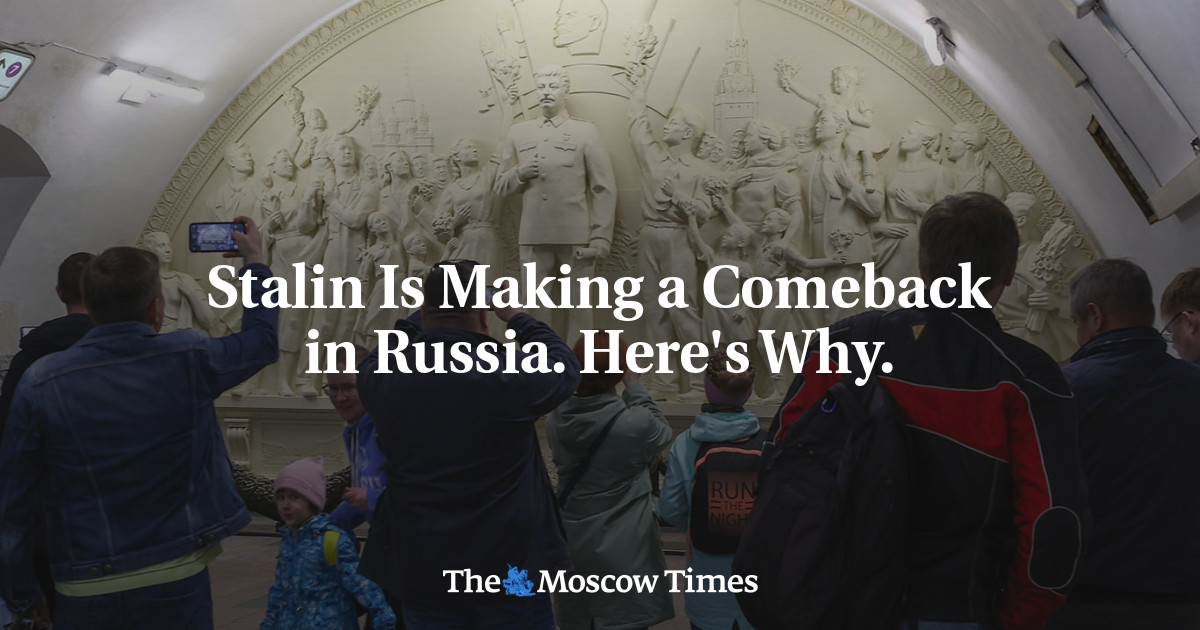Stalin's Legacy And Its Influence On Contemporary Russian Politics

Welcome to your ultimate source for breaking news, trending updates, and in-depth stories from around the world. Whether it's politics, technology, entertainment, sports, or lifestyle, we bring you real-time updates that keep you informed and ahead of the curve.
Our team works tirelessly to ensure you never miss a moment. From the latest developments in global events to the most talked-about topics on social media, our news platform is designed to deliver accurate and timely information, all in one place.
Stay in the know and join thousands of readers who trust us for reliable, up-to-date content. Explore our expertly curated articles and dive deeper into the stories that matter to you. Visit NewsOneSMADCSTDO now and be part of the conversation. Don't miss out on the headlines that shape our world!
Table of Contents
Stalin's Long Shadow: How the Soviet Dictator's Legacy Still Shapes Modern Russia
Joseph Stalin's death in 1953 didn't mark the end of his influence. His brutal reign continues to cast a long shadow over contemporary Russian politics, shaping its power structures, national identity, and even its foreign policy. Understanding this legacy is crucial to comprehending the complexities of modern Russia.
The Cult of Personality and Authoritarian Rule:
Stalin's legacy is inextricably linked to the cult of personality he meticulously cultivated. His image as a strong, decisive leader, capable of restoring Russia's global power after years of turmoil, remains potent in certain segments of Russian society. This legacy has contributed to a persistent acceptance, even romanticization, of authoritarian rule. The current political system, while not a direct replica of Stalinism, shares certain characteristics: a powerful executive branch, limited political pluralism, and a controlled media landscape. The suppression of dissent and the centralization of power bear a striking resemblance to Stalinist tactics, albeit often implemented with more subtle methods.
Nationalism and the "Great Power" Narrative:
Stalin's emphasis on Russian national identity and the restoration of Russia as a global superpower profoundly impacted subsequent political narratives. The rhetoric of reclaiming lost territories and asserting Russia's rightful place on the world stage echoes Stalinist pronouncements. This narrative, often used to justify assertive foreign policy decisions, continues to resonate with many Russians, fueling both national pride and anxieties about external threats. The ongoing conflict in Ukraine, for example, can be viewed through this lens – a struggle for influence and the preservation of historical spheres of power.
The Persistent Influence on the Economy:
While the Soviet command economy collapsed decades ago, remnants of Stalin's centralized economic model still linger. The state's considerable control over key industries, the dominance of state-owned enterprises, and the often-opaque nature of economic decision-making all reflect a legacy of centralized planning, albeit with market mechanisms playing a larger, albeit still controlled role. This creates a complex economic landscape where both private and state sectors operate, often intertwining in unpredictable ways.
Memory, Revisionism, and Historical Narratives:
The official portrayal of Stalin's era in Russia has been subject to significant shifts and revisions throughout history. While periods of "de-Stalinization" have occurred, attempts to completely erase his legacy have ultimately failed. The current narrative tends to be a complex mix of condemnation of his atrocities and a selective celebration of his achievements, such as industrialization and victory in World War II. This selective memory contributes to a continuous debate on how to interpret the past and its implications for the present. The manipulation of historical narratives remains a powerful tool for shaping public opinion and bolstering the legitimacy of the current regime.
Conclusion: A Complex and Enduring Legacy
Stalin's legacy is undeniably complex. While his crimes against humanity are undeniable and widely condemned, his influence on contemporary Russian politics is undeniable. Understanding this legacy, with its blend of authoritarianism, nationalism, and economic centralism, is essential for anyone seeking to comprehend the dynamics of modern Russia and its place in the global order. The ongoing debate surrounding his memory serves as a powerful reminder of the enduring power of the past in shaping the present. The shadow of Stalin continues to loom large, influencing Russia's political landscape in profound and often unpredictable ways.

Thank you for visiting our website, your trusted source for the latest updates and in-depth coverage on Stalin's Legacy And Its Influence On Contemporary Russian Politics. We're committed to keeping you informed with timely and accurate information to meet your curiosity and needs.
If you have any questions, suggestions, or feedback, we'd love to hear from you. Your insights are valuable to us and help us improve to serve you better. Feel free to reach out through our contact page.
Don't forget to bookmark our website and check back regularly for the latest headlines and trending topics. See you next time, and thank you for being part of our growing community!
Featured Posts
-
 R Rajkumar And Jai Ho Co Star Mukul Dev Dies At 54 Deepshikha Nagpal Leads Tributes
May 25, 2025
R Rajkumar And Jai Ho Co Star Mukul Dev Dies At 54 Deepshikha Nagpal Leads Tributes
May 25, 2025 -
 Ac Milans Star Studded Lineup A Serie A Challenge For Ranieri And Others
May 25, 2025
Ac Milans Star Studded Lineup A Serie A Challenge For Ranieri And Others
May 25, 2025 -
 Ayush Mhatres Brutal Assault On Arshad Khan 28 Runs In One Over Against Shubman Gill
May 25, 2025
Ayush Mhatres Brutal Assault On Arshad Khan 28 Runs In One Over Against Shubman Gill
May 25, 2025 -
 Lewis Hamilton Reveals Cause Of Verstappens Monaco Penalty
May 25, 2025
Lewis Hamilton Reveals Cause Of Verstappens Monaco Penalty
May 25, 2025 -
 Wisconsin Coach Sammy Demands More After Crushing Loss
May 25, 2025
Wisconsin Coach Sammy Demands More After Crushing Loss
May 25, 2025
Latest Posts
-
 Annabelle Doll Missing A New Orleans Mystery Deepens
May 25, 2025
Annabelle Doll Missing A New Orleans Mystery Deepens
May 25, 2025 -
 Two Massive B C Lottery Wins In One Month 40 Million Jackpot And A Record Prize
May 25, 2025
Two Massive B C Lottery Wins In One Month 40 Million Jackpot And A Record Prize
May 25, 2025 -
 Nyt Wordle May 24 2024 Game 1435 Solution And Helpful Hints
May 25, 2025
Nyt Wordle May 24 2024 Game 1435 Solution And Helpful Hints
May 25, 2025 -
 Cricket Prodigy Ayush Mhatre Stuns With 28 Run Over Against Arshad Khan
May 25, 2025
Cricket Prodigy Ayush Mhatre Stuns With 28 Run Over Against Arshad Khan
May 25, 2025 -
 Monaco Grand Prix 2025 Live Updates Results And Race Analysis
May 25, 2025
Monaco Grand Prix 2025 Live Updates Results And Race Analysis
May 25, 2025
